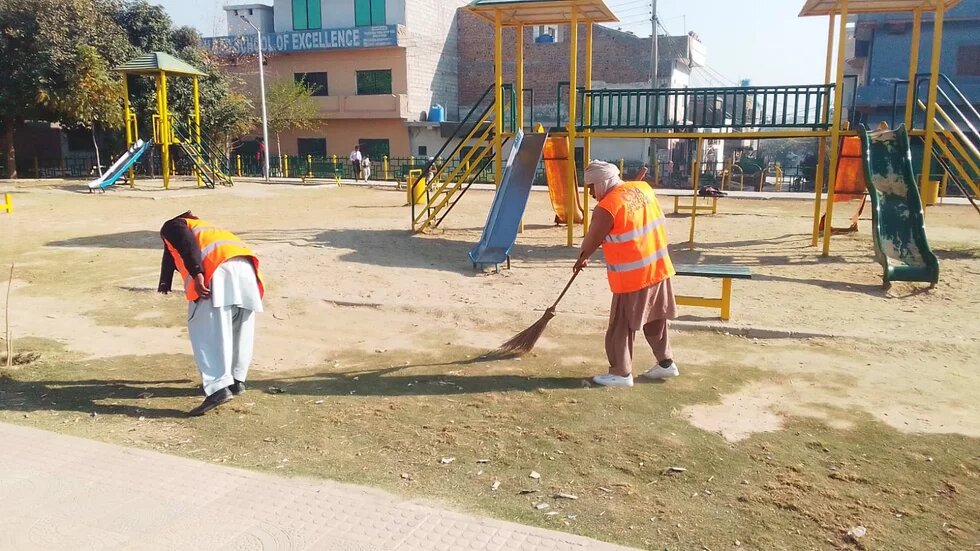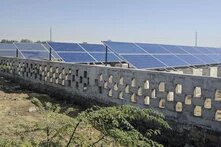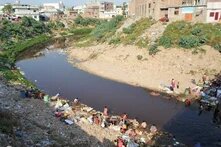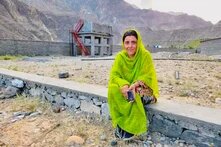The power of bottom-up community action supported by established development and government actors is clearly visible in the way Islamabad’s Farash Town has utilised its waste as a resource to drive systemic change.

Islamabad, Pakistan’s capital city, is perceived as a relative haven of “clean urbanity”. It is widely recognised as the country’s most liveable city surrounded by lush green hills, clean and organised streets. However, Islamabad is increasingly sprawling to its outskirts leading to peri-urban development. In these areas – from the farmlands of Banigala, Chak Shahzad, Malot and Barakaho to the katchi abadis (informal settlements) to low income housing societies of Farash Town – urban infrastructure and amenities are very weak when it comes to waste management as the Capital Development Authority (CDA)’s writ is non-existent.
On an unseasonably warm autumn evening, in the first week of November 2024, citizens of the area from various social strata and sectors, came together for a town hall meeting to hold a consultation with the city administration. The meeting was organised by Islamabad’s leading non-profit Institute of Urbanism (IoU) with the support of Heinrich Böll Stiftung (hbs) to tackle the city’s ever increasing waste issue. Entitled “Empowered Communities: A Town Hall on Waste Management Responsibilities”, it brought together community representatives, policymakers, and CDA sanitation directorate staff to explore sustainable solutions for Islamabad’s growing waste issues, especially in Farash Town and I-10[i].
According to IoU, Islamabad generates about 1,600 tonnes of waste daily. Around 60 per cent of the waste is managed by the CDA and the rest is burned or dumped posing significant risks to both environmental and public health. Only 15 per cent of the waste is recycled, underscoring the urgent need for enhanced resource recovery and sustainability measures. Moreover, Islamabad is at a high-risk for emerging smog challenges like other major cities of Pakistan like Lahore; a significant part of the polluted air quality comes from waste burning and transboundary pollution issues.
While there are insurmountable challenges, such as harmful air quality index (AQI) and waste management problems, there are also opportunities for community action and development. Unlike other sectors in Islamabad, Farash Town lacks a structured waste management system as the CDA does not provide regular door-to-door waste collection services here, forcing residents to discard waste at street corners. When waste piles up without collection, residents turn to open burning as a solution but this leads to increased pollution levels in Farash Town, contributing to air contamination and negatively impacting public health.
Acknowledging this, a number of development organisations and grassroots initiatives, such as IoU, have stepped in to support the residents of Farash Town. This article looks into the impact of development and government support on the ability, awareness and capacity of the residents of Farash Town to manage their waste problem and analyse the lived realities of residents, especially community leaders, to take action when formal channels do not support them.
History and bottom-up interventions
According to conservative estimates, there are 38 katchi abadis in Islamabad inhabited by more than 70,000 dwellers in poor living conditions. Under its urban shelter programme, the CDA has accorded the provision for basic facilities to 10 katchi abadis. A considerable number of Farash Town’s residents were previously living in these informal settlements and were diverted to the model village after katchi abadis were razed by the CDA[ii].
Farash Town was envisioned as one of the CDA's “model villages” in 1990. Now, it resembles a typical unplanned settlement with nominal municipal facilities. There are about 3,000 households in the two phases of Farash Town.
While razing katchi abadis in the capital has seen an uptick since 2005 due to rising demand for housing for the country’s emerging middle-class, the model city of Farash Town was an experiment in relocation of the city’s lower-income groups[iii]. Farash Town residents have been facing problems due to shortage of drinking water, poor sewerage and lack of waste management facilities[iv]. In order to rally for their citizen rights and solve for collective problems, the residents of Farash Town formed an informal community-based organisation (CBO), especially for waste management issues, but this community governance framework was formalised further by the Australia-Pakistan Water Security Initiative (APWASI).
A collaborative effort between the governments of Australia and Pakistan and being implemented by the World Wide Fund for Nature Pakistan (WWF-Pakistan), the APWASI was designed to enhance water resource management and improve access to clean water in Pakistan. Working closely with disadvantaged communities, such as residents of Farash Town, the project is promoting the “Water Sensitive Cities” approach in the twin cities of Islamabad and Rawalpindi where sustainable water management practices are integrated into the urban landscape. This intervention has cemented the community governance framework role of CBOs and village organisations (VOs) in Farash Town. While CBO members are responsible for identifying water related needs and priorities of the community, promoting advocacy and knowledge, collaborating and co-leading interventions and developing cooperation between local groups, government and other stakeholders for community uplift, the role of VOs is to collect funds for the sustainability of APWASI and other such interventions, share project related data with CBOs, and raise community awareness on the efficacy of intervention and bolster multi-stakeholder cooperation[v]. The formalisation of CBOs and VOs has created opportunities for the emergence of community leaders and solidifying their impact, as residents see the positive changes ushered in by such leaders.
For instance, Farash Town’s residents have been tackling their waste management problem by pooling in funds from households in the neighbourhood to hire garbage collectors. There are still some teething problems but the residents are trying to sort them out.
According to VO 4 President Yasmeen Aziz, every household contributes about Rs.300 rupees monthly and this helps the community call waste collectors every week to clear the garbage. It is a system that works but not very efficient as often the collectors are late and the garbage dumped outside rots, causing smell and making the neighbourhood look bad. It usually takes four days for waste to be collected from each household and many people become impatient. “Residents revert to open dumping and burning because they can’t wait for the garbage-man,” Aziz said
Nonetheless, community leaders agree that the formalisation of their governance structure has identified an open channel of communication with the CDA, which has been playing a more active role in solving Farash Town’s problems and lack of amenities. CBO members attribute the increased intervention of the CDA to more conscientious leadership within the CDA as well as to development aid’s intervention.
“These international NGOs have much more importance and connections than community members like us. So when they started working here, they got in touch with the CDA on our behalf and asked them to help. Earlier, we did not have access to the CDA but now its personnel come here to take care of the waste whenever we send them WhatsApp pictures of open garbage dumps,” said CBO Vice President Naseem Akhtar.
Development interventions have helped transform the spatiality and amenities in Farash Town. Community members proudly lead visitors to the newly made public park, with the support of WWF and Australian Aid, teeming with jubilant children as they play on swings and dizzying mechanical merry-go-rounds.
According to Dr. Ejaz Ahmad, Senior Programme Fellow at IoU, solid waste management was identified as another pressing issue in the area. IoU initiated discussions with the CBO, WWF, and CDA to establish an effective waste management system. Capacity-building and training sessions were conducted with the CBO, along with activities like cleaning campaigns, awareness drives to encourage community participation. These efforts helped the community recognise the importance of addressing solid waste issues, prompting them to engage with CDA and WWF on the matter. As a result, CDA agreed to take responsibility for solid waste management in the area.
“IoU also worked to educate the CBO about the environmental and health impacts of improper waste management. With IoU's support, the CBO prepared a charter of demand, which was presented to CDA for action. Given the community's strong sense of ownership and common interest in the success of the waste management system, the initiative has a high likelihood of achieving sustainable success,” said Dr. Ahmad.
IoU has also given support through training, awareness and community tools and is working closely with community leaders and members to facilitate demands to the city administration. It has identified key challenges related to waste management in the community, including issues of waste segregation, open dumping, and burning.
It organised a comprehensive three-day training aimed at enhancing the community's capacity to manage waste sustainably. The training covered essential topics such as waste segregation, composting, recycling, and upcycling. To further engage the community, IoU also led a community walk and clean-up drive, during which they identified areas where open dumping and burning were prevalent. Building on these efforts, the think tank is now facilitating the community's advocacy by supporting them in taking their concerns to the relevant authorities. To advance this agenda, IoU organised the town hall meeting to elevate the community's demands and address these issues at the policy level.
Such interventions have empowered community members and started to transform Farash Town’s waste management. While, the community has myriad challenges and it has a long way to go, there is a palpable sense of development and improvement in the neighbourhood.
Ownership, gentrification and waste management
However, where community leaders play an integral role in acting as conduits between the wider community, the CDA and NGOs, not all residents are fully on board with this governance model. Many of the residents of Farash Town are suspicious of the model and feel it to be a threat to their existence.
Akhtar Mian (name changed to protect identity) migrated from Karachi to the settlement two decades back. For the 69-year-old, legal ownership of residents over their houses is more important than a waste management drive, which should be the responsibility of the government and CDA and not community leaders.
Residents like Mian were given plots in Farash Town on the basis of just stamp papers without no-objection certificates (NOCs). Insecure of their ownership over their houses, such residents are wary of being a part of the community’s waste management effort. They are more worried about eviction due to land grabs and gentrification.
Gentrification, in fact, poses a threat in the form of rising cost of living and repeated displacement. Residents said that they felt insecure when they heard that the CDA had floated ads for the sale of apartments in a segment of Farash Town to overseas Pakistanis in a bid to earn foreign remittances[vi]. They fear that CDA’s more active role in the area may also be a bid to make Farash Town more gentrified for investment by higher-income groups.
However, according to Dr. Ahmad, the CDA began paying attention to the area largely due to the persistent efforts of the CBO, which put pressure on it to take action. “The CDA's primary focus was on water supply issues, as this fell under their jurisdiction. Meanwhile, WWF secured a project grant for initiatives related to water supply and rainwater harvesting. This grant further encouraged the CDA to begin work in the area,” Ahmad said.
Farash Town is a part of the Naya Pakistan Housing Development Authority (NAPHDA) that has built 2,000 low-cost subsidised apartments through a joint venture with the CDA.[vii] Community leaders keep assuring residents that the plots for sale to overseas Pakistanis would not impact the ownership of current residents and their rights would be protected. It may be noted that in 2023, Prime Minister Shehbaz Sharif ordered an inquiry against the CDA for launching the Nilore Heights project for overseas Pakistanis without removing lacunas, stalling such a development further[viii].
According to CBO President Manzoor Ahmed, a resident of Farash Town for the past 17 years, gentrification of surrounding areas has had unintended positive consequences for Farash Town’s residents. “When I moved here, there was no gas, no hospital or university but infrastructure has improved gradually with richer people moving into the surrounding areas. Now, we have all these amenities and resources closer to us,” he added.
One of their most pertinent “waste management” problems for the residents and community leaders however, is the respectful burials of the deceased. While amenities such as shops, restaurants, schools and hospitals are being overhauled to attract more development and real-estate investment, graveyards are not getting the same attention as they are less profitable.
Behavioural change and youth leadership
There has been significant research in Farash Town on behavioural change models pertaining to attitudes towards waste management and recycling. In order to shift attitudes, beliefs and actions about waste management, the role of creating awareness is critical but reducing friction for residents to dispose of waste efficiently requires infrastructure as well, such as waste bins and routine collection.
The theory of planned behaviour (TPB) and perceived behavioural control (PBC), which determine intention and behaviour have been employed by researchers, policy-makers and community change-agents to predict and evaluate people’s behaviours and it has been widely applied to waste-related behaviours such as recycling and prevention[ix]. Studies show that personal norms are often created through the internalisation of social norms; socially held values have a significant influence of personal norms on waste prevention behaviours.
Moreover, studies in similar socio-economic contexts as Pakistan have shown that open and indiscriminate dumping of solid wastes by householders is significantly related to the general quality of housing services that they enjoy; those enjoying higher quality of housing services are less likely to engage in open dumping of waste[x]. Thus, it can be argued that one intervention would be to increase the quality of housing services for Farash Town residents so that their waste management behaviours also improve.
Yasmeen has witnessed remarkable behavioural change in Farash Town. “It is human nature to dump trash in a clean spot when you don’t have the right trash cans for it. But things are changing for the better,” she said.
While external and spatial factors such as lack of dumping bins and trash cans has a significant influence on waste management behaviour, Farash Town’s residents are trying to transform individual and community attitudes and actions through collective social action. Community leaders are expecting more trash cans to be installed by the CDA or development organisations.
“We sometimes feel a bit stuck waiting for others to help us. But we have to take action ourselves through awareness drives and clean up walks. We feel that the attitude of most of the residents about taking ownership of their neighbourhood streets and keeping them clean is changing,” said VO3 Vice President Iffat Iftikhar.
Community leaders especially see the positive change in Farash Town’s youth who are becoming more aware of their civic duty and emerging as young leaders themselves. Witnessing the developmental interventions taking place in their area, especially the water tanks and park, has made Bilal Khan and his young friends feel more responsible towards their neighbourhood. They see the VO and CBO members as role models because of their efforts to make Farash Town more liveable. “We feel that if we work hard, we can make a difference and be respected in our community. When outsiders come and see our cleaner streets, they will automatically respect us more,” said Bilal.
The perceptiveness of these young men has touched upon not just behavioural and perception theories but practical case studies as well, which recognise adaptive leadership as “both shared ownership and continuous learning [that] are central to achieve lasting behaviour change…when people think of solid waste management, they think you need…vehicles for collection, composting machinery, biogas plants, etc., which are definitely an important part, but it's all about people.”[xi]
The power of bottom-up community action supported by established development and government actors is clearly visible in the way Farash Town has utilised its waste as a resource to drive systemic change and make linkages to build a more liveable settlement.
The sessions conducted by the IoU team also played a crucial role in raising awareness among the community and the CBO about the health and environmental impacts of improper waste management. Participants were introduced to the concept of viewing waste as a resource and exploring opportunities in waste management. Specific training was provided on composting techniques, focusing on converting wet or kitchen waste, which constitutes over 50 per cent of the total waste, into compost, promoting sustainable practices within the community.
Building on the success of such human-centred solutions for peri-urban waste management like Farash Town, community empowerment seems to be as impactful as building landfill sites and enhanced waste management infrastructure[xii].
Out of the box waste management solutions can play an overlooked yet key role. For instance, due to the efficacy of WhatsApp as a community mobility tool, the introduction of a simple mobile app or hotline could provide a user-friendly way for residents to report instances of open waste burning directly to the relevant authorities. Such a platform would allow citizens in rural and urban areas alike to instantly report illegal burning activities to the CDA or Pakistan Environmental Protection Agency (Pak-EPA), prompting faster response times. With GPS-enabled reporting, the location of the incident could be pinpointed, allowing swift intervention. This solution would not only help in monitoring open waste burning but also serve as a deterrent by increasing the likelihood of timely action and fines for those violating regulations.
Yasmeen who is one of the prominent community leaders in Farash Town and runs a school as well is very active on social media where she keeps posting about community interventions and her personal poetry. This is her way of connecting with the youth and seeking out a “window to the world” because she feels that her community can learn a lot from other places with similar challenges and solutions, and with their continued action, people can learn from the example of Farash Town as well.
ENDNOTES
[i]https://www.nation.com.pk/01-Nov-2024/islamabad-community-representatives-seek-collective-solutions-as-daily-waste-surpasses-600-tons
[iii]"38 illegal slums in capital to be razed”, The Dawn, 2015. https://www.dawn.com/news/1203778
[iv]Alipur Farash dwellers protest against lack of facilities. Thenews.com.pk. Retrieved on 2012-05-13.
[x] https://www.researchgate.net/publication/342216413_Indiscriminate_open_space_solid_waste_dumping_behaviour_of_householders_in_the_Brong-Ahafo_region_of_Ghana_a_political_economy_analysis
[xi]Facilitating behavior change in complex waste management systems, Acumen Blog. September 2018. https://blog.acumenacademy.org/facilitating-behavior-change-complex-was…


